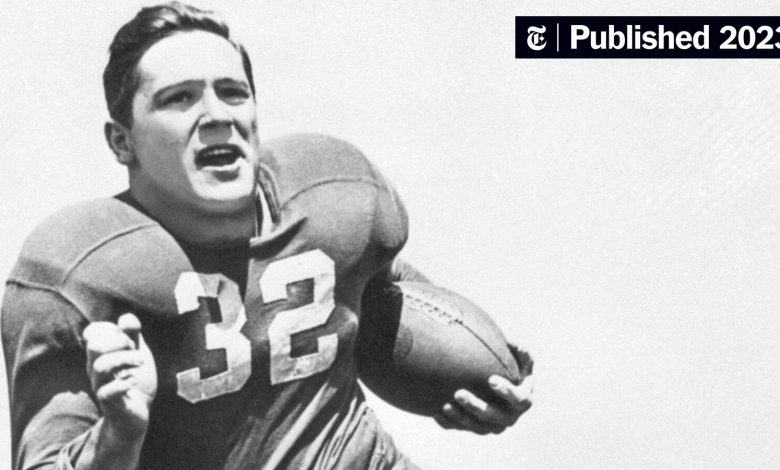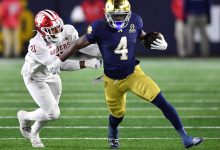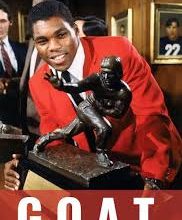Notre Dame Heisman winner Johnny Lujack was an unassuming star.

Johnny Lujack, one of the most iconic figures in Notre Dame football history, remains a celebrated Heisman Trophy winner who was, paradoxically, an unassuming star. In a sport where flamboyance often takes center stage, Lujack’s quiet confidence and understated approach set him apart from the brash personalities that populated the game. His journey from a young, unheralded player to one of college football’s most decorated quarterbacks is not just a testament to his talent, but also to his work ethic, poise, and humility. While the world of sports has often glorified the larger-than-life figures who dominate the headlines, Johnny Lujack’s story is a reminder that greatness doesn’t always need to come with a spotlight.
Born on January 4, 1921, in Connellsville, Pennsylvania, Lujack grew up in a working-class family. His humble beginnings in the small town provided him with a strong sense of discipline, determination, and perspective. Growing up, Lujack wasn’t known as a standout athlete from the start, but his passion for sports and his competitive spirit were undeniable. His talent, however, would soon become evident, and as he excelled at football and other sports during his high school years, he caught the attention of college recruiters across the country.
Lujack’s choice to play for the Notre Dame Fighting Irish in 1941 was not the most obvious one. At the time, Notre Dame was already one of the most storied programs in college football, with a rich history of success and an impressive coaching staff. But despite the program’s illustrious reputation, Lujack didn’t arrive in South Bend as a player destined to change the course of Notre Dame football. He was a humble young man who was just happy to have earned the chance to play for a school with such a rich tradition.
At 6 feet tall and weighing around 190 pounds, Lujack was by no means the most imposing athlete on the field. What he lacked in physical stature, however, he more than made up for with his sharp football intelligence, remarkable vision, and leadership qualities. His early years at Notre Dame were marked by steady progress, as he worked under the tutelage of legendary head coach Frank Leahy. While other players might have craved the spotlight, Lujack was content to work quietly, earn his spot, and contribute to the team’s success.
Lujack’s rise to prominence began in 1943, when he became the starting quarterback for Notre Dame. That year, the Fighting Irish were coming off a national championship in 1943, and expectations were high. Lujack, a sophomore at the time, took the reins of the team and immediately displayed the qualities that would make him one of the most successful quarterbacks in college football history.
Under Lujack’s leadership, the Irish soared. He brought a sense of stability to the quarterback position, leading the team with a combination of efficiency and athleticism. Notre Dame finished the season undefeated, earning a national championship in 1943. Lujack’s calm demeanor and ability to manage the game were crucial to his success, as he showed a poise that belied his years.
While the 1943 season was a defining moment in Lujack’s career, it was only the beginning of his legacy. As a sophomore, he was already starting to demonstrate an innate understanding of the game, excelling at both running and passing the football. His ability to read defenses and make quick decisions was a trait that would define his career at Notre Dame.
By 1947, Lujack had become the focal point of the Fighting Irish offense. That year, he led the Irish to an undefeated record and their second national championship during his time in South Bend. His individual accomplishments were impressive, but it was his ability to elevate those around him that made him such an exceptional player. Lujack was a dual-threat quarterback, capable of both making pinpoint passes and scrambling when necessary. His athleticism and field awareness kept opposing defenses guessing, while his leadership qualities helped unite the team around a common goal.
It was during that 1947 season that Johnny Lujack truly solidified his place in college football lore. The Fighting Irish finished the season with a perfect 9-0 record, and Lujack’s performance on the field earned him the prestigious Heisman Trophy, awarded to the best player in college football. He became the first Notre Dame player to win the Heisman since Angelo Bertelli in 1943, and his achievement cemented his status as one of the best quarterbacks to ever play the game.
Lujack’s Heisman-winning season was marked by his ability to make clutch plays in critical moments. He threw for 1,171 yards and 12 touchdowns, and rushed for another 200 yards. But it wasn’t just his statistics that impressed voters and fans alike; it was his ability to lead his team to victory in games where every possession counted. His performances in big games, such as Notre Dame’s 38-7 victory over Army, where Lujack accounted for multiple touchdowns, demonstrated his ability to rise to the occasion.
Despite his tremendous success on the field, Lujack’s demeanor never changed. He remained the same quiet, unassuming individual who was more focused on the success of the team than on individual accolades. He didn’t seek the spotlight; instead, he embraced the leadership role that came with being Notre Dame’s quarterback and Heisman winner. His humility and selflessness made him an even more respected figure within the Notre Dame community.
What made Lujack truly unique as a player was not just his talent, but his playing style. In an era when college football was transitioning into a more pass-heavy game, Lujack was a versatile and adaptable quarterback who could execute both running and passing plays with equal proficiency. His physical attributes allowed him to be a dual-threat quarterback, able to break off runs and keep opposing defenses off balance. He wasn’t the fastest player on the field, but his agility and quick decision-making allowed him to make plays with his legs when needed.
As a passer, Lujack was methodical and efficient. He didn’t make flashy throws or try to force the ball into tight windows; rather, he was known for his accuracy and ability to read defenses. His passes were often delivered with perfect timing, allowing his receivers to make plays after the catch. While other quarterbacks of the era relied more on raw arm strength, Lujack’s ability to manage the game and make the right decisions at the right time is what set him apart.
But perhaps what made Lujack such an exceptional leader was his ability to rally his teammates and keep them focused, even in the most challenging situations. His quiet, yet effective leadership style was something that resonated with his teammates, who admired his work ethic and commitment to the team’s success. He didn’t raise his voice in the locker room or seek to dominate conversations; instead, he led by example. His poise under pressure and refusal to panic in the face of adversity were qualities that helped Notre Dame win games and secure the national championship.
After winning the Heisman Trophy in 1947, Lujack’s career at Notre Dame was already etched in the history books. He went on to play in the 1949 Cotton Bowl and finished his college career with 21 career victories, several of which came against top-ranked teams. While he could have chosen to play in the NFL after his successful college career, Lujack instead decided to enter the professional world, pursuing a career in business and taking a break from football.
Nevertheless, his legacy at Notre Dame remained untarnished. He was inducted into the College Football Hall of Fame in 1960 and became one of the most revered figures in Notre Dame history. He continued to remain humble and grounded despite his success, rarely seeking attention for his accomplishments. The legend of Johnny Lujack is not just about his Heisman Trophy or his national championships; it’s about the kind of person he was, both on and off the field. He was the definition of quiet excellence, the kind of player who let his actions speak for themselves and let the accolades come naturally.
Lujack’s impact on Notre Dame football is immeasurable. He helped set the standard for what it meant to be a Fighting Irish player—dedicated, humble, and willing to put the team above all else. His success served as a model for future generations of players, demonstrating that greatness doesn’t always come with fanfare or attention, but rather with hard work, discipline, and a commitment to the greater good of the team.
Johnny Lujack’s legacy is more than just a Heisman Trophy and a national championship. It’s the story of a man who never sought fame but achieved it through his remarkable ability to lead, perform, and inspire. In an era where athletes are often celebrated for their flamboyance, Lujack’s legacy is a timeless reminder that true greatness often lies in the quiet moments of brilliance, in the unassuming stars who rise to the occasion without seeking the limelight.









